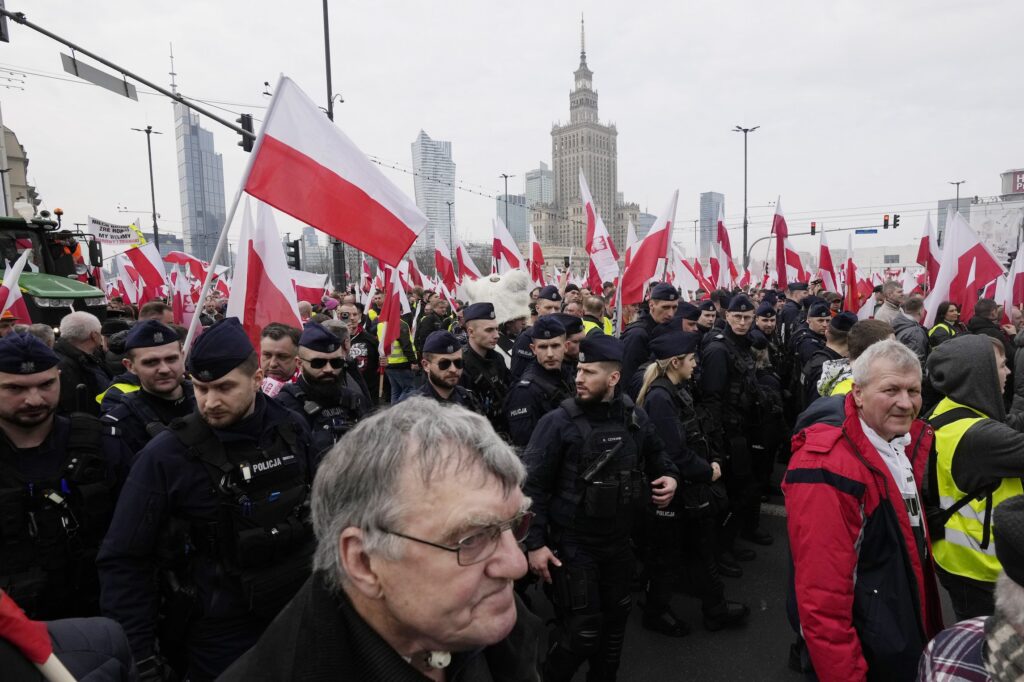An expanding protest by farmers opposed to the influx of Ukraine‘s grain into Poland is beginning to threaten Lithuania’s national security, according to the NATO ally’s top diplomat.
“It’s obviously reminiscent of some hybrid operations which are intensively exploited by Russian propaganda,” Lithuanian Foreign Minister Gabrielius Landsbergis said on Wednesday, per a Vilnius-based outlet. “The actions planned in the Suwalki Gap no longer resemble protests, but actions against the national security of both Poland and Lithuania.”
Western strategists have long regarded the Suwalki Gap, a 40-mile stretch of shared border between Poland and Lithuania, as one of the most vulnerable chokepoints in NATO. That area is a NATO boundary that divides Belarus, a Russian client state, from Kaliningrad — the Russian exclave on the Baltic Sea. A group of protesting Polish farmers have announced a plan to barricade the border in a bid to thwart the suspected import of Ukrainian grain, which is driving down prices for their crops.
“The idea of blocking the Lithuanian border came up in the context of thinking about how to put more pressure on the Polish government,” protest organizer Karol Pieczyński told LRT Radio, a Lithuanian public broadcaster. “[The Ukrainian] agricultural production is transferred from trucks to trains in Poland. Their final destination is transit ports on the Baltic Sea, but farmers suspect that some of this production is staying in Poland.”

That tactic, however, touches a nerve in the Baltic states — Lithuania, Latvia, and Estonia — three NATO allies long anxious that Russia might someday launch an attack that cuts their countries off from the allies to the south.
“We [Baltics] do not like it at all, cause those roads are the only ones that connect us with Europe by land — strategically important,” a senior Baltic official explained to the Washington Examiner.
Poland has functioned as one of Ukraine’s most stalwart supporters in Europe in the years since Russia launched the full-scale invasion. Polish civilians and volunteers have made major efforts to aid Ukrainian refugees. And successive Polish governments, on the right and the left, favor robust Western military support for Ukraine. But the European Union’s decision to drop trade restrictions on Ukrainian grain following the Russian blockade of the Black Sea has come at a financial cost for increasingly frustrated Polish farmers.
“It will not be a complete blockade of the border crossing,” Pieczyński said. “We, farmers, together with the Polish authorities, would like to check what is being transported in the trucks, with particular attention to those vehicles that have the potential to transport agricultural products.”
The planned blockade represents an expansion of protests at Polish-Ukrainian border crossings. And the uproar has contributed to the Polish government’s desire to restore the European Union’s trade restrictions on Ukrainian exports.
“To maintain strategic support for Ukraine, we have to solve the grain issue … Some of the farmers that protest about the grain actually feel for Ukraine, but you need to know what happened,” Polish Foreign Minister Radoslaw Sikorski said Monday at the Atlantic Council. “So this is just my view, but we should go back to the pre-war rules of trade, and then start negotiating with Ukraine her entry into the European Union and the single market . . .Because we have politics too. And Polish farmers cannot bear the brunt of all of EU’s solidarity with Ukraine. That wouldn’t be fair.”
Pieczyński, the protest organizer, pledged that his associates are “against any kind of provocation” in the midst of the controversy.
CLICK HERE TO READ MORE FROM THE WASHINGTON EXAMINER
“We make sure that no radicals, marginals, or other initiatives that are politically unfavorable to us emerge among us,” he said. “We coordinate our protests with the authorities to ensure that all protests are legitimate and peaceful, and avoid any contact with potential provocateurs.”
Lithuanian officials, for their part, are less than satisfied with those assurances. “I hope that our partners in Poland see this as we do, and we will do everything possible to prevent it from escalating,” Landsbergis said.
